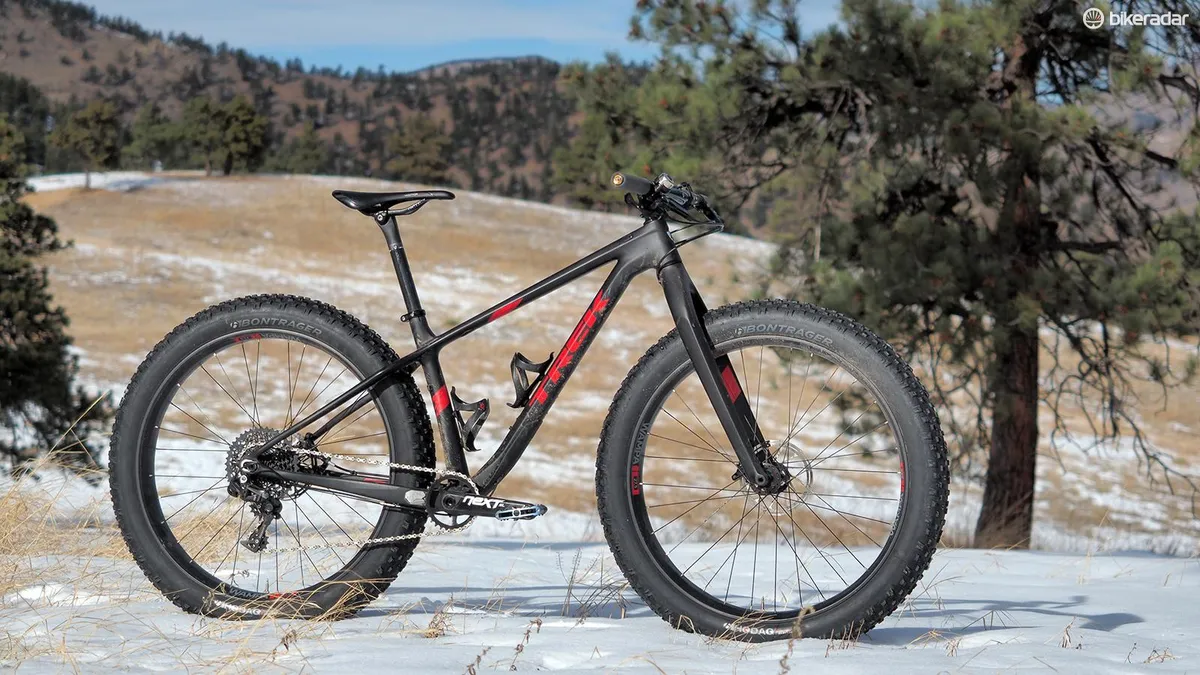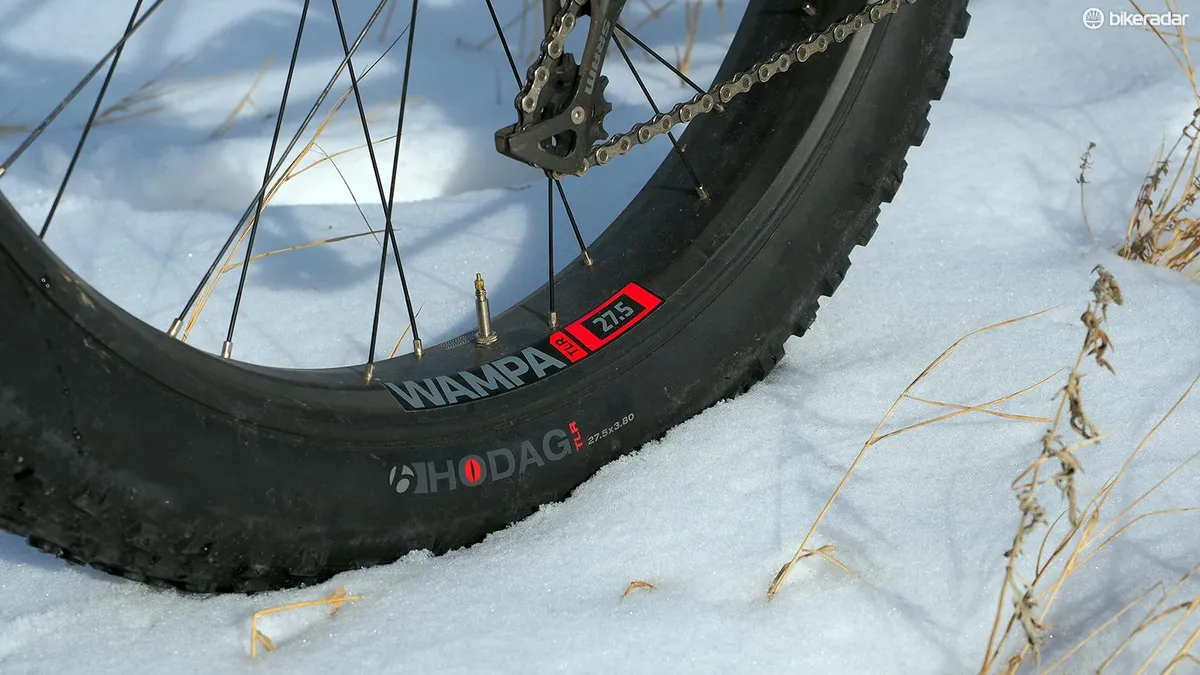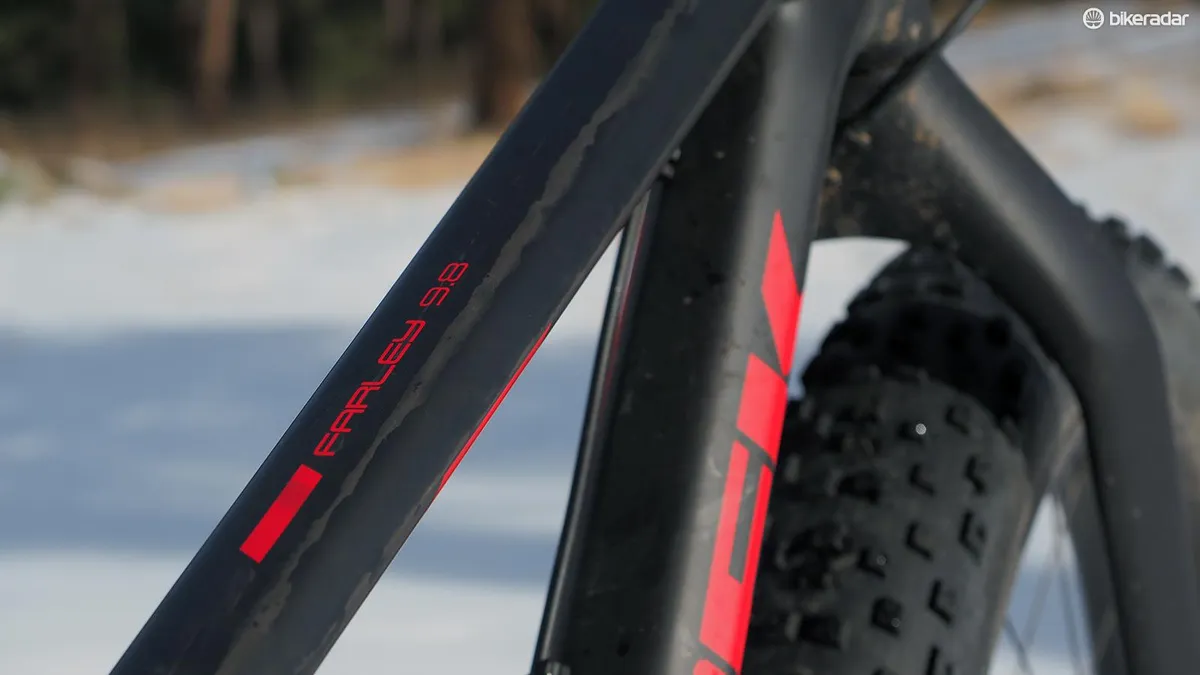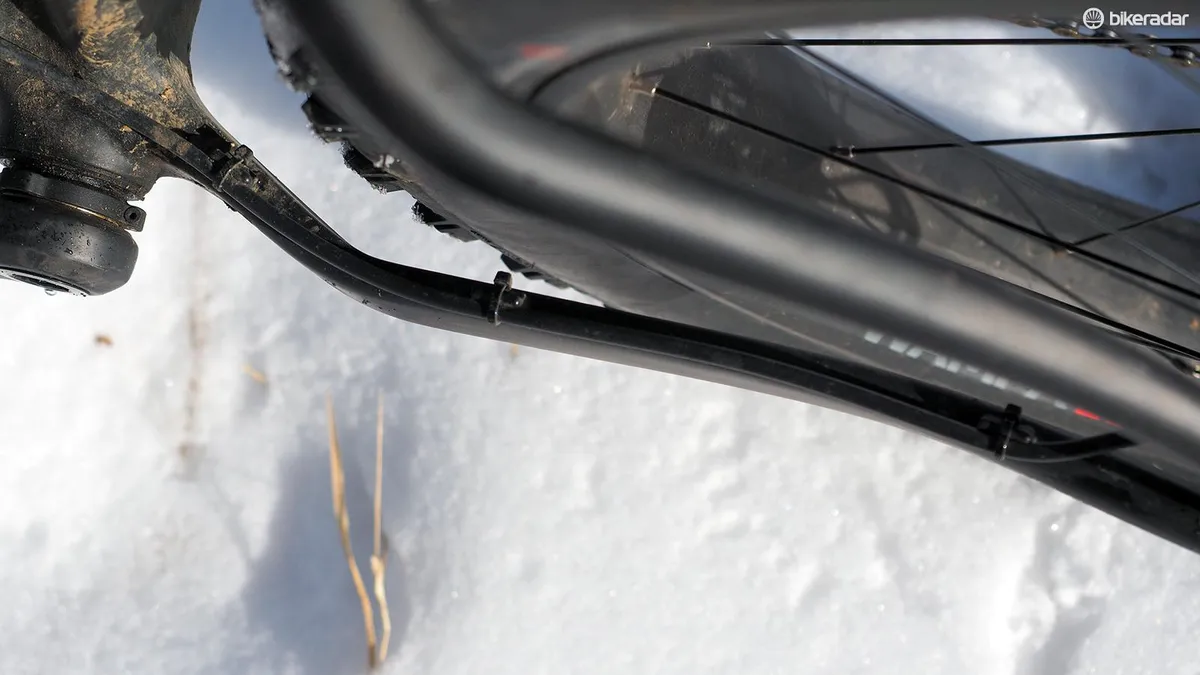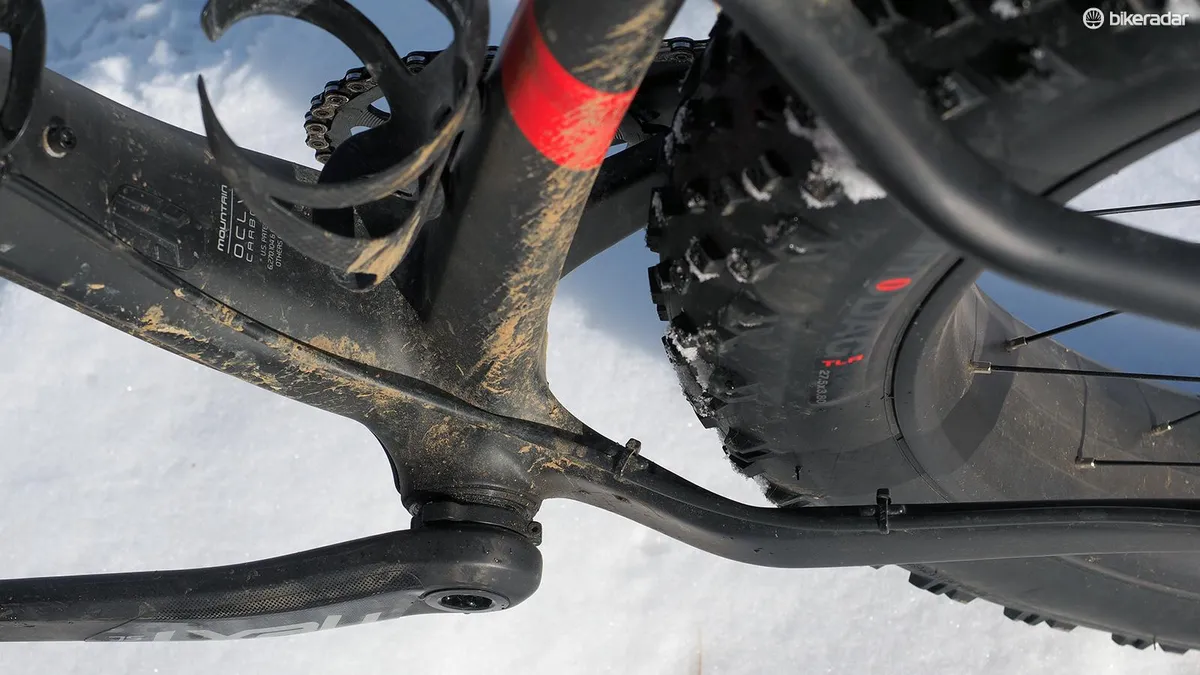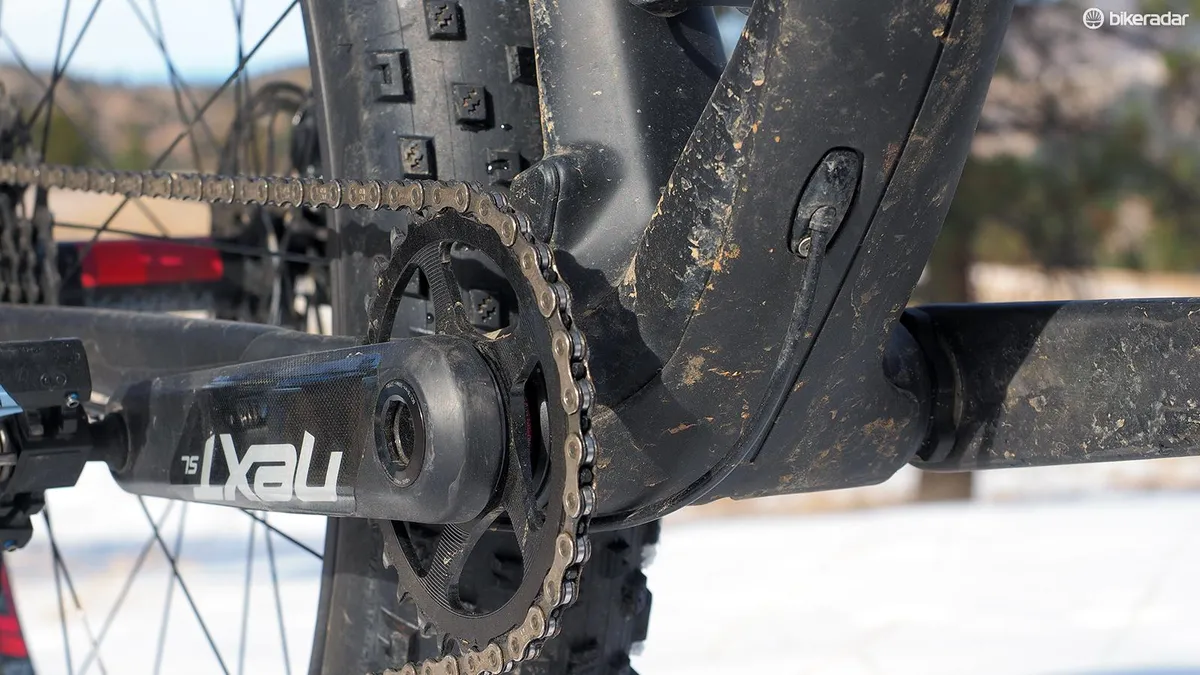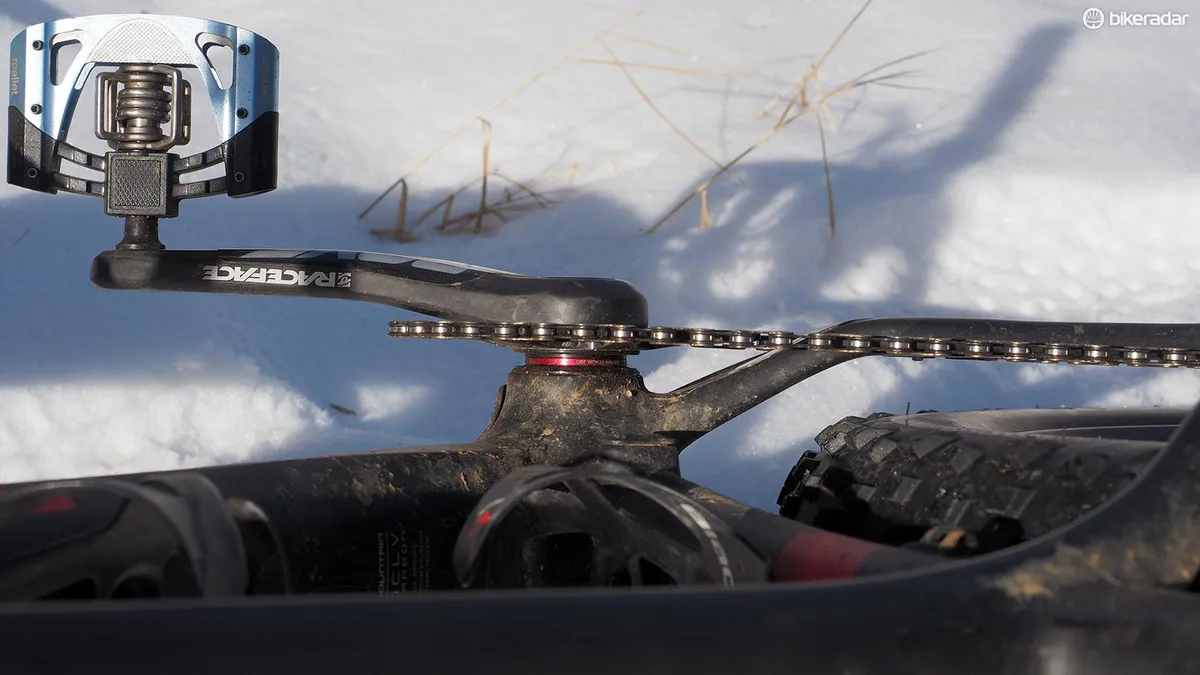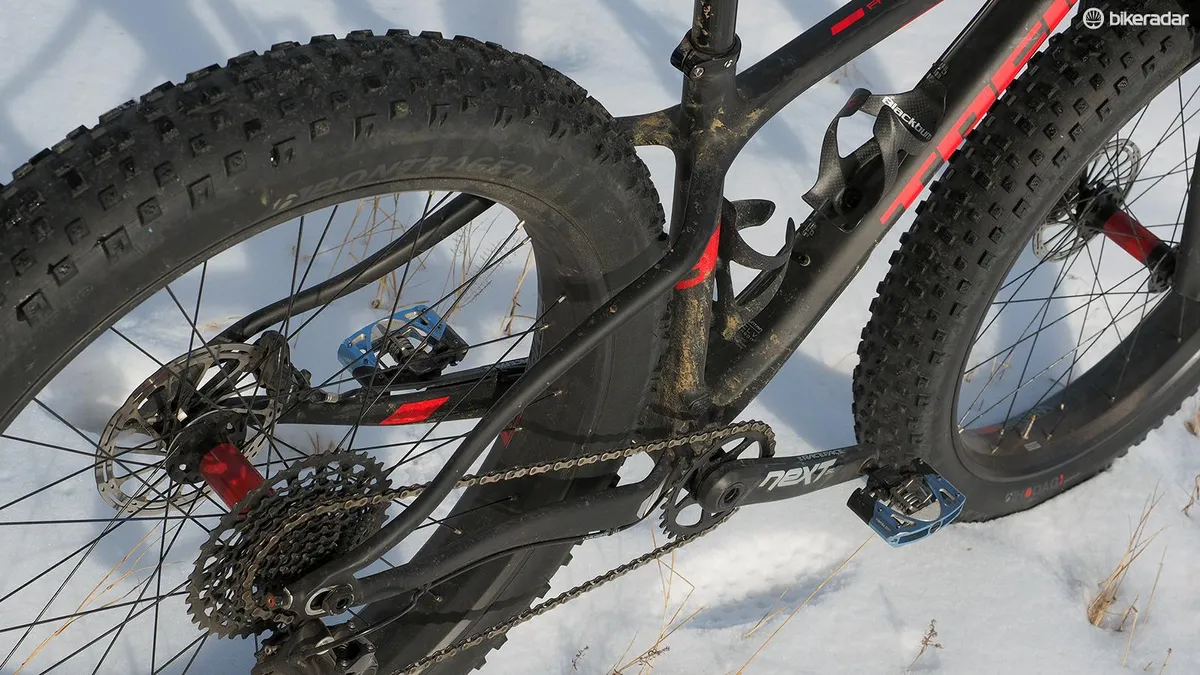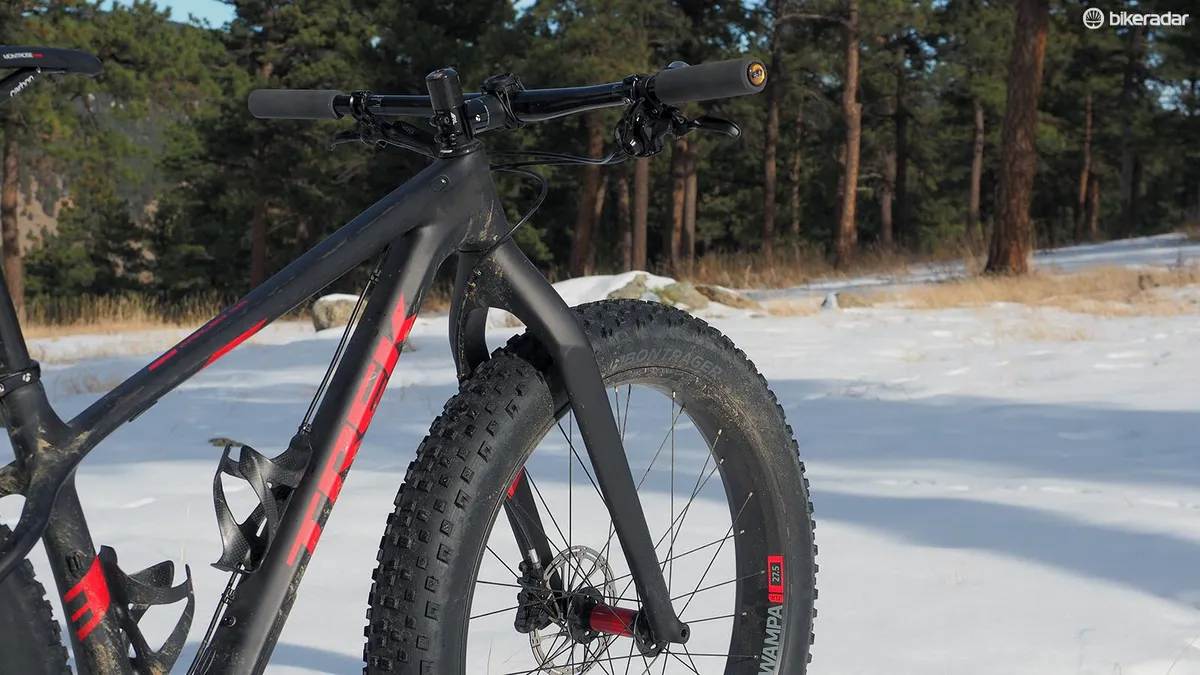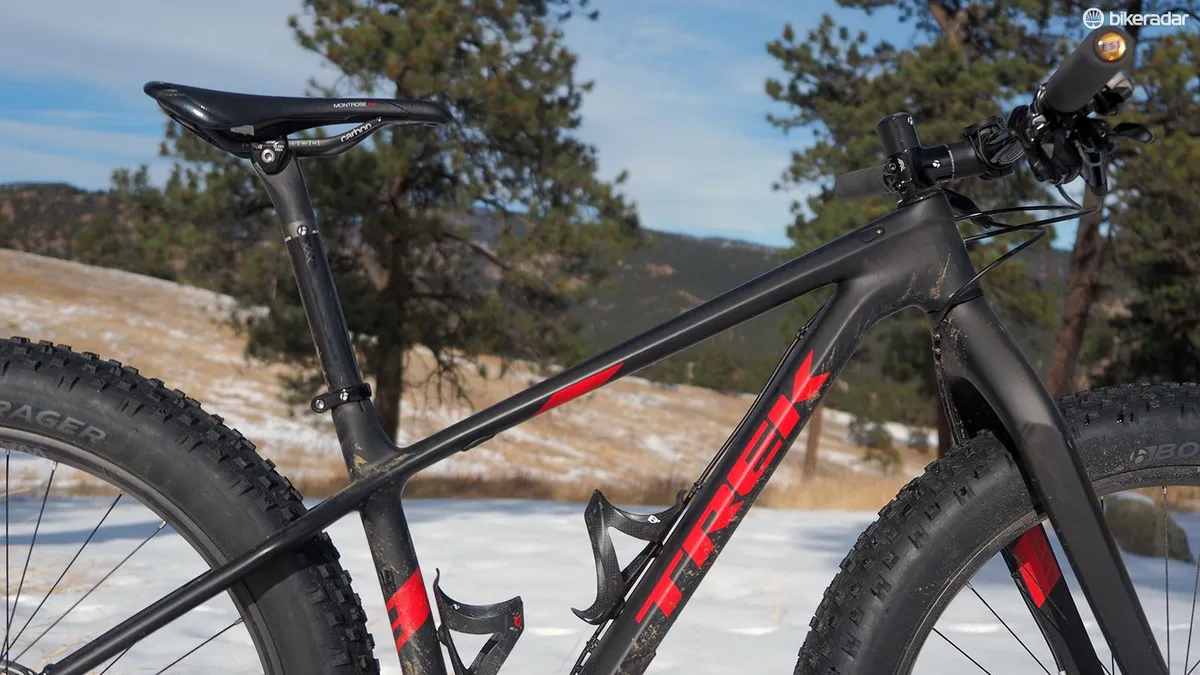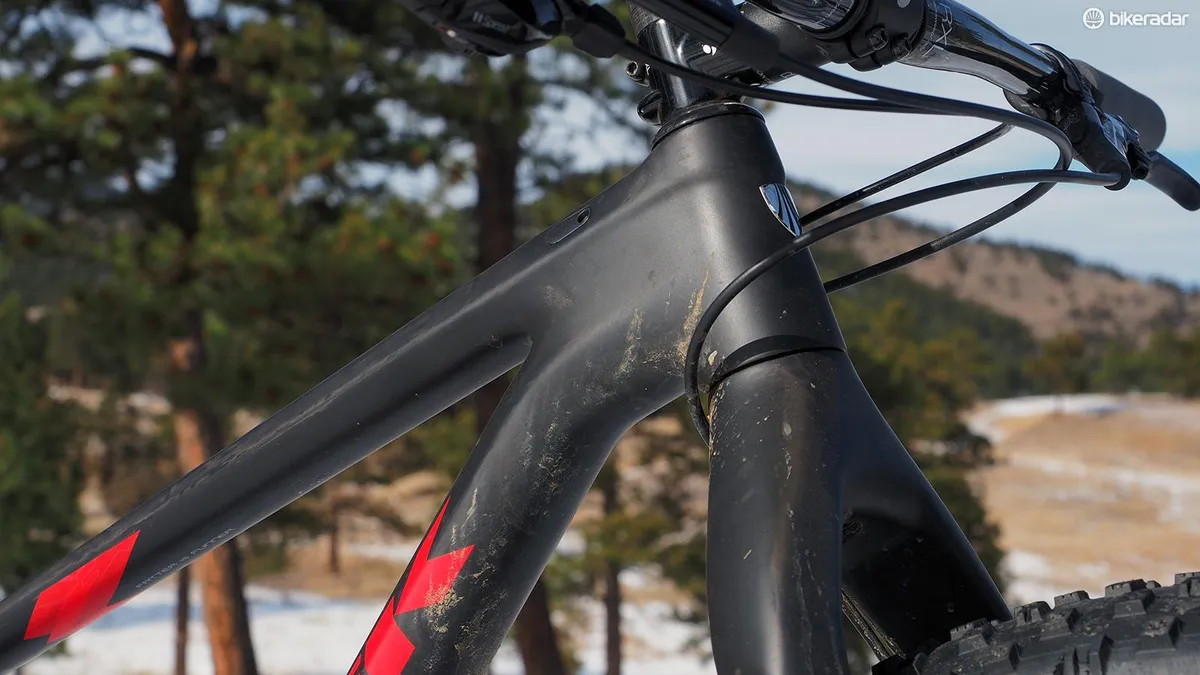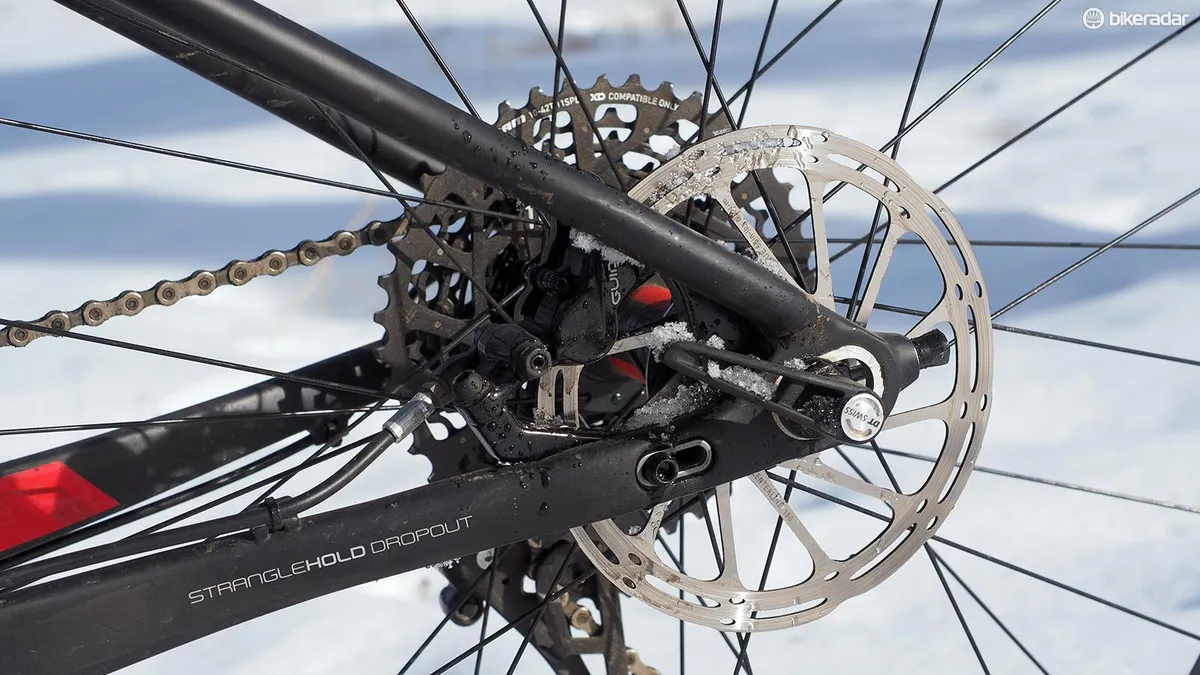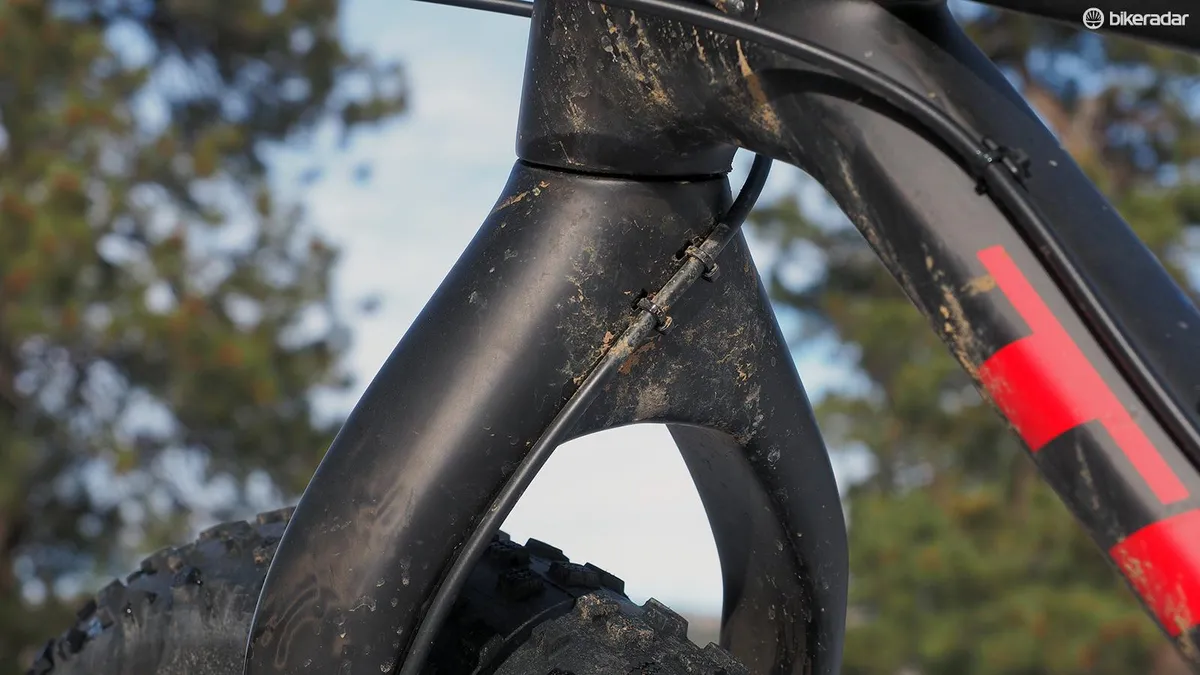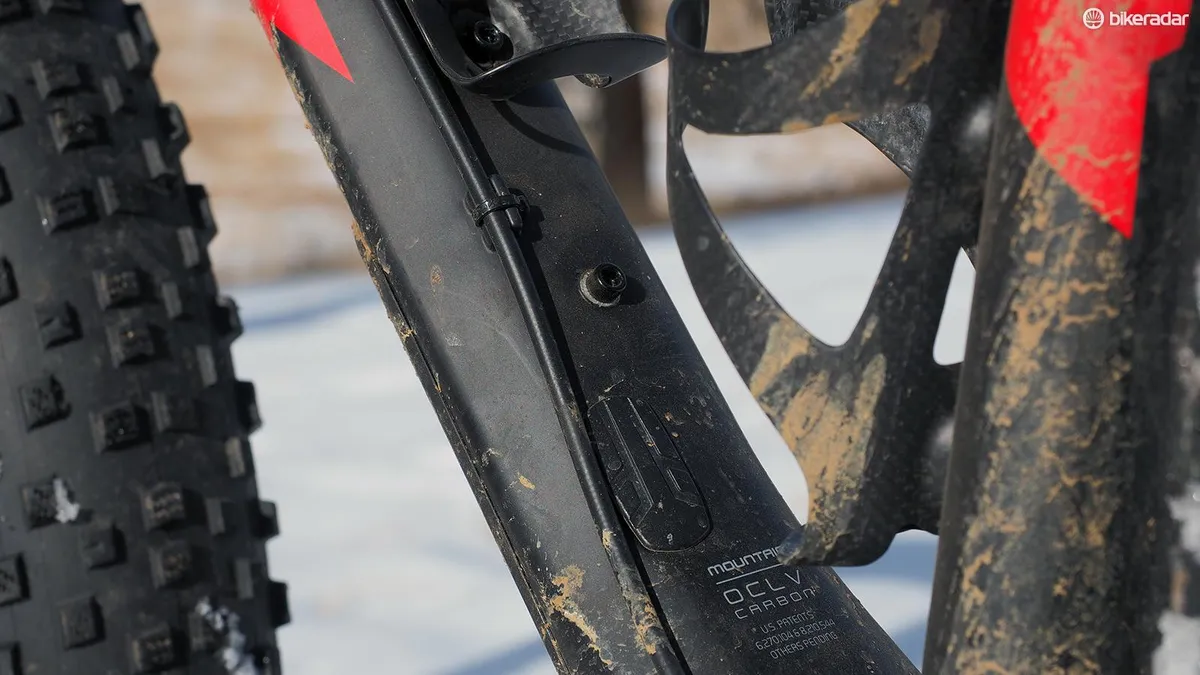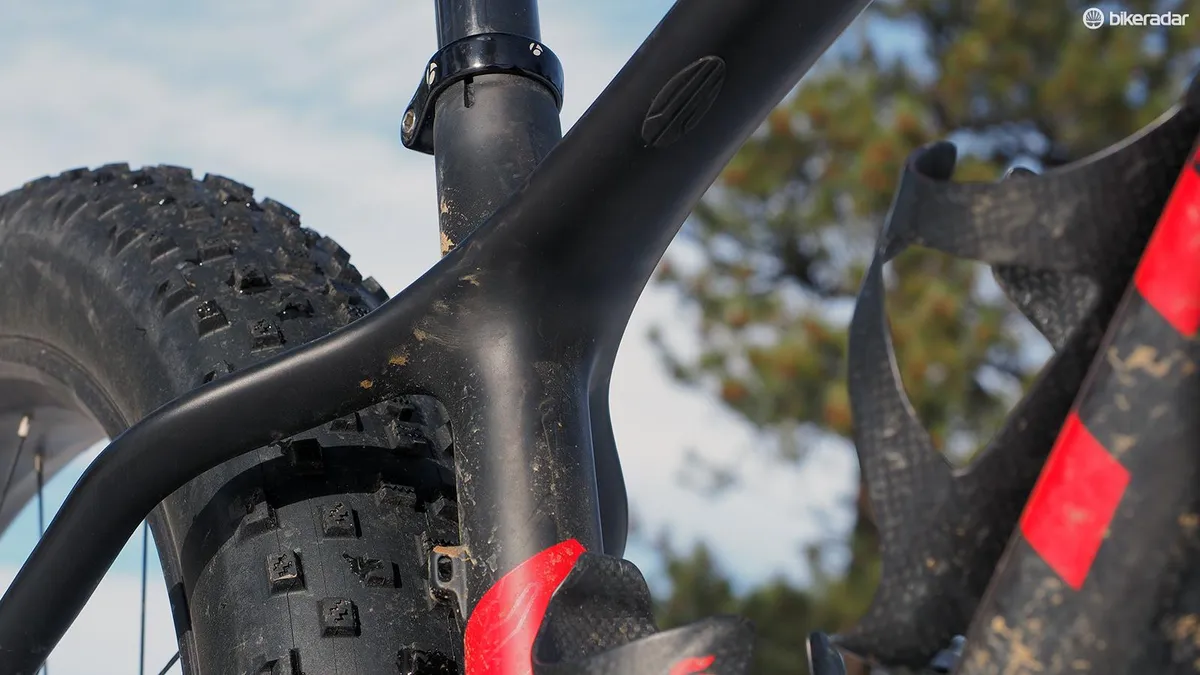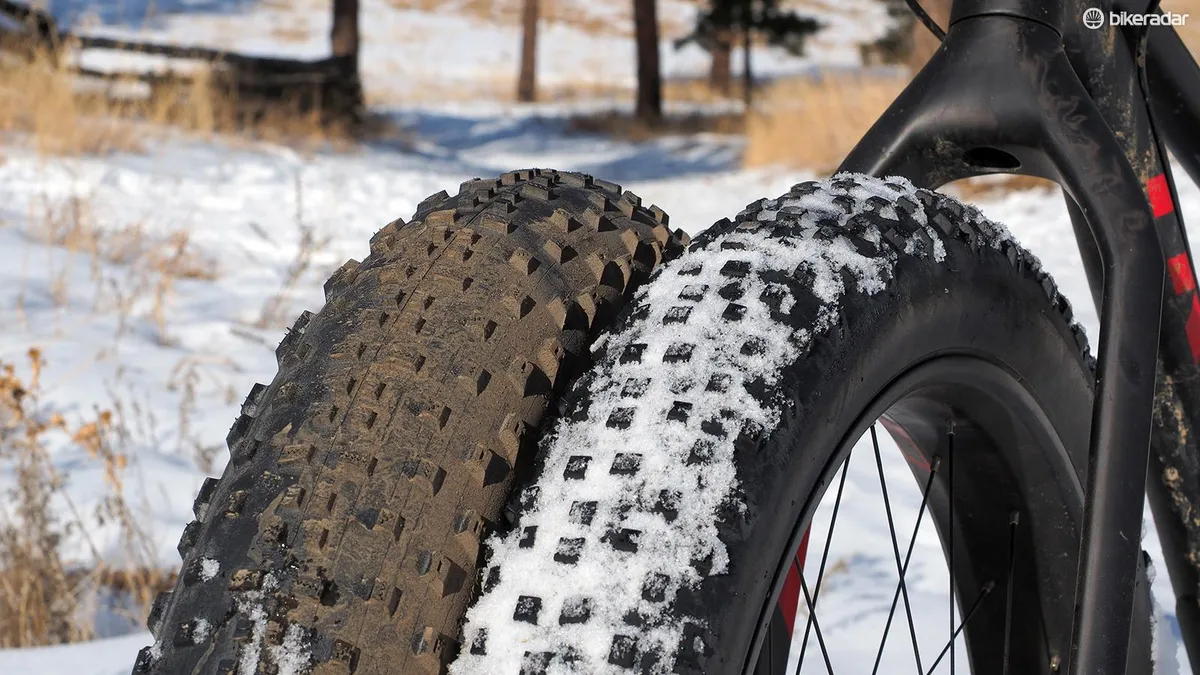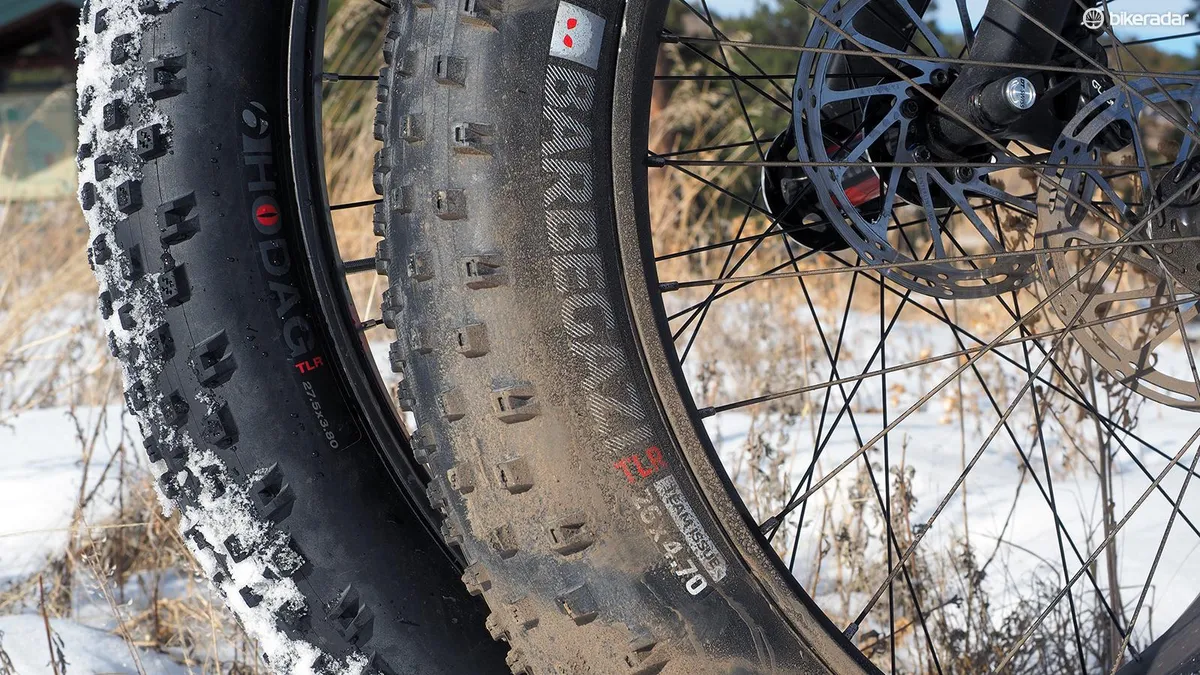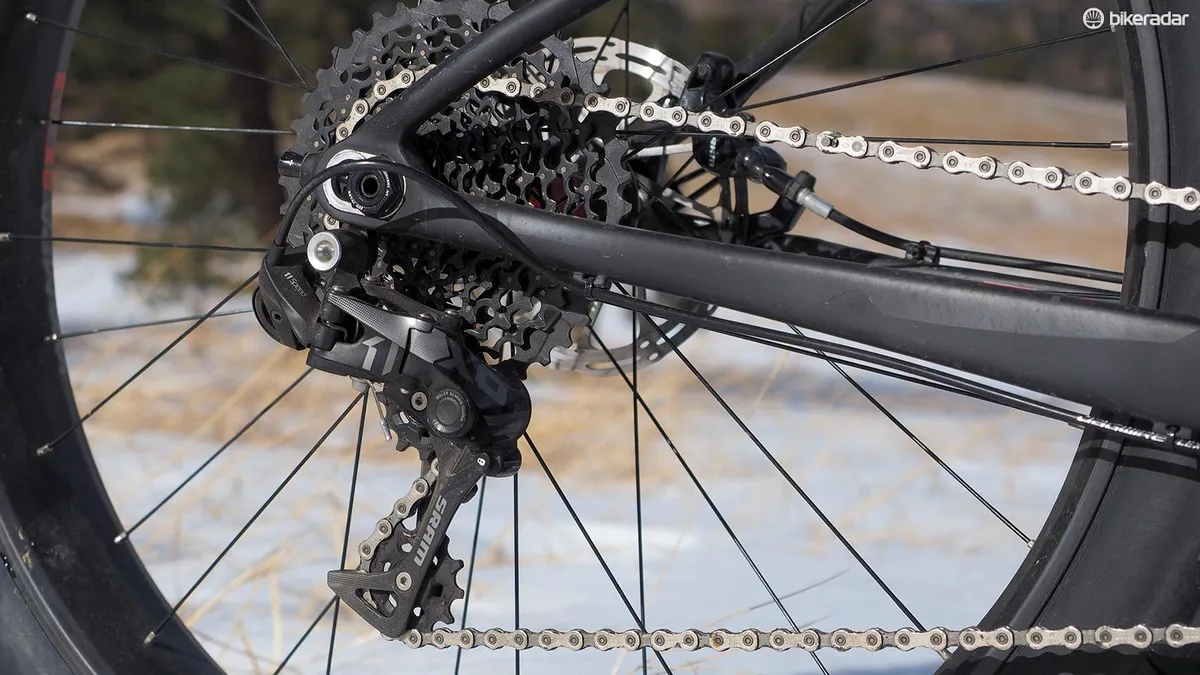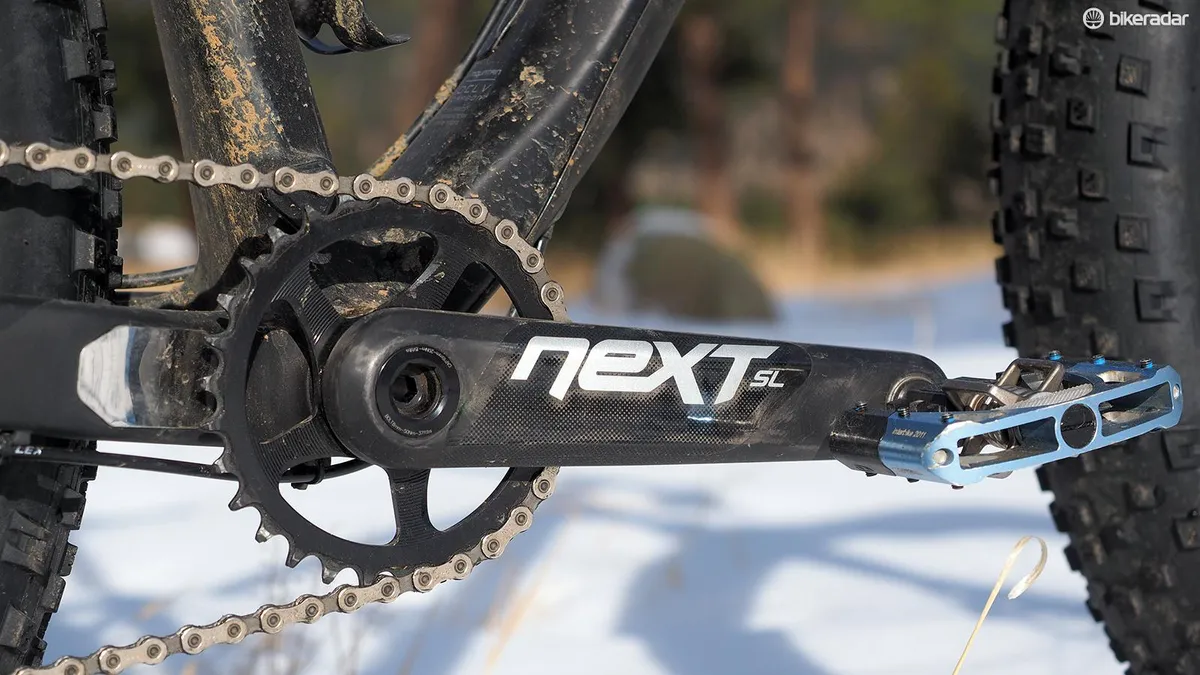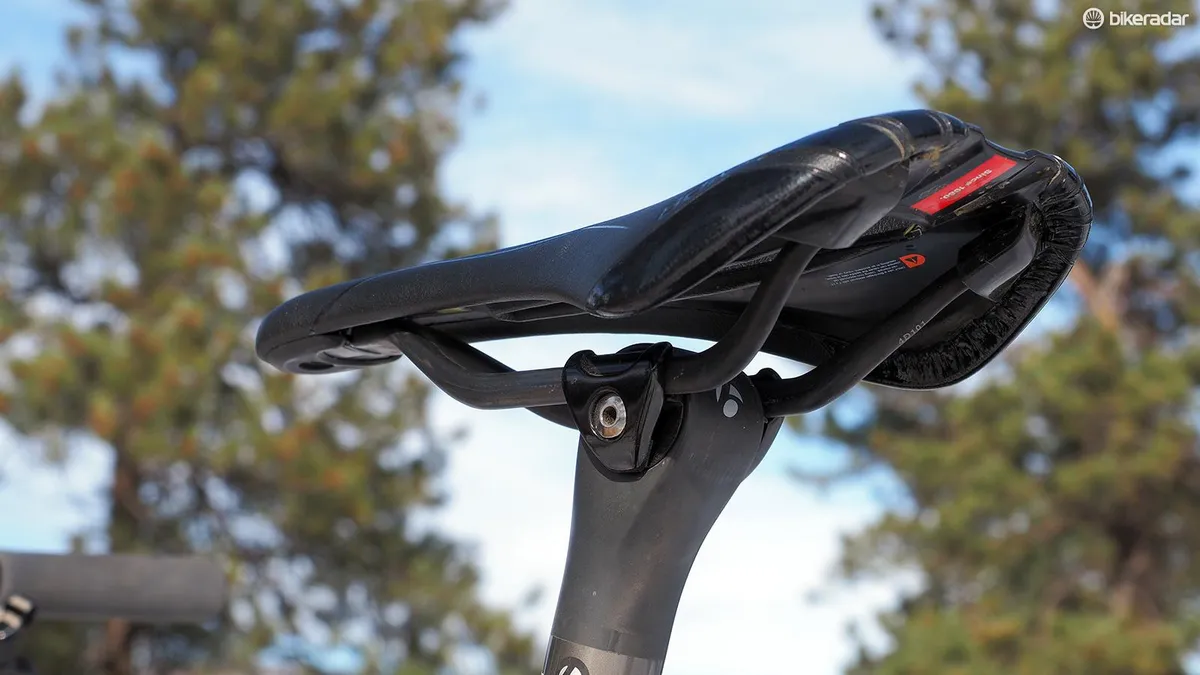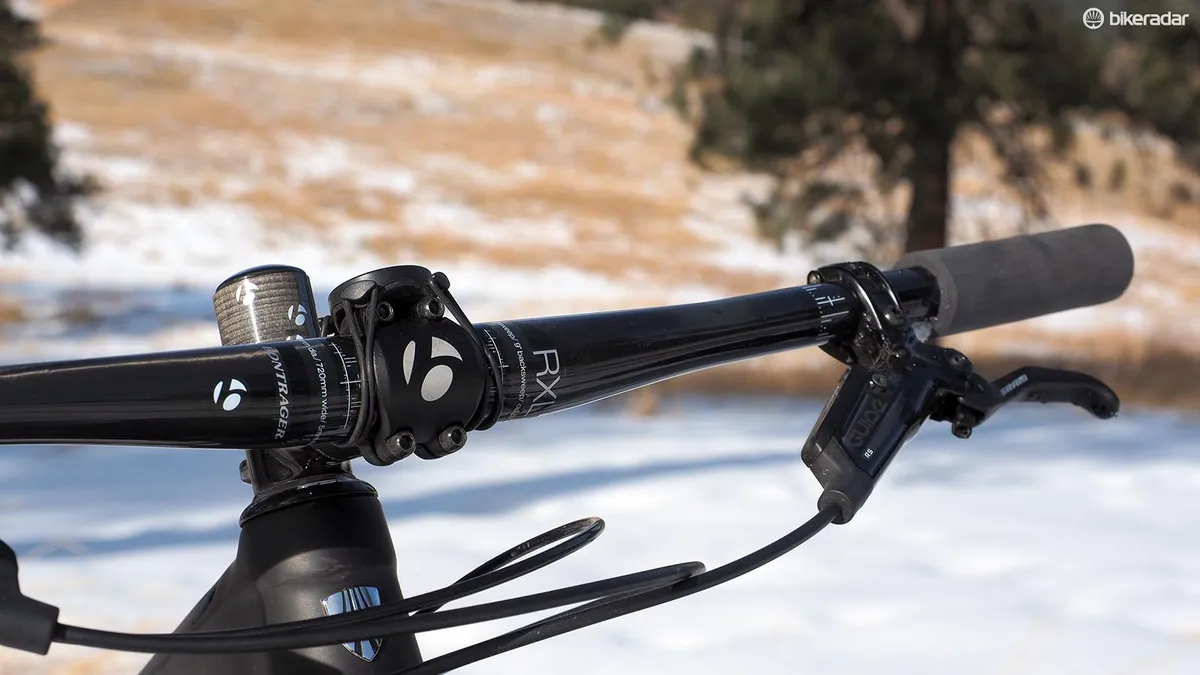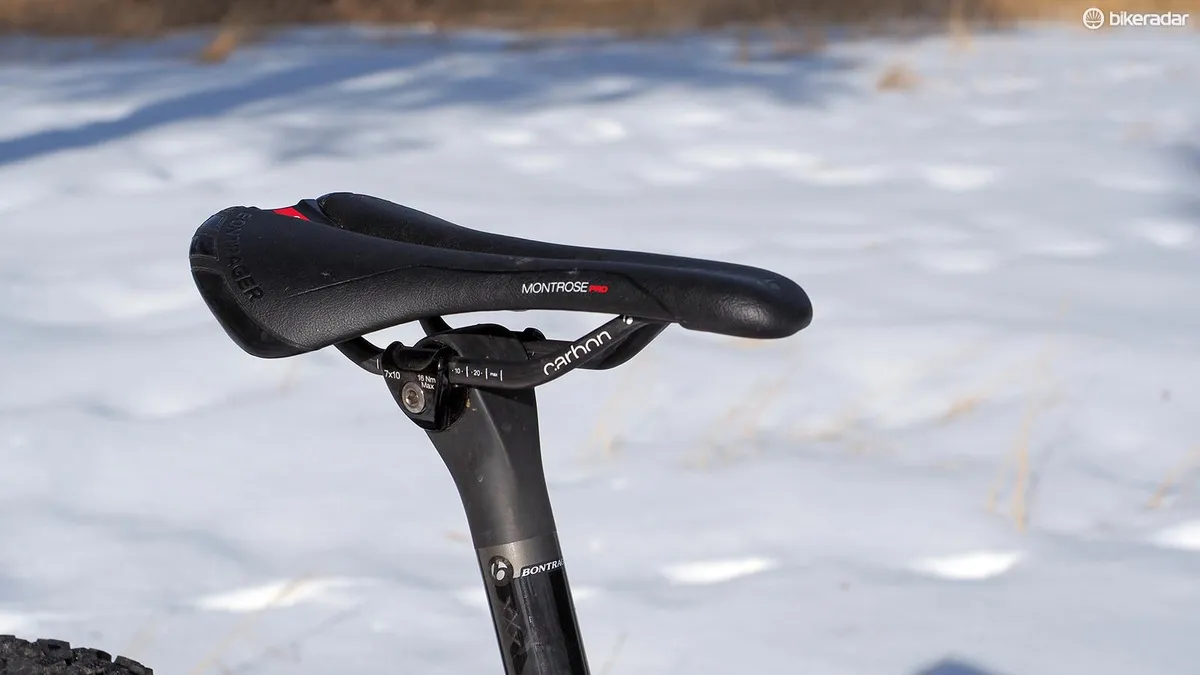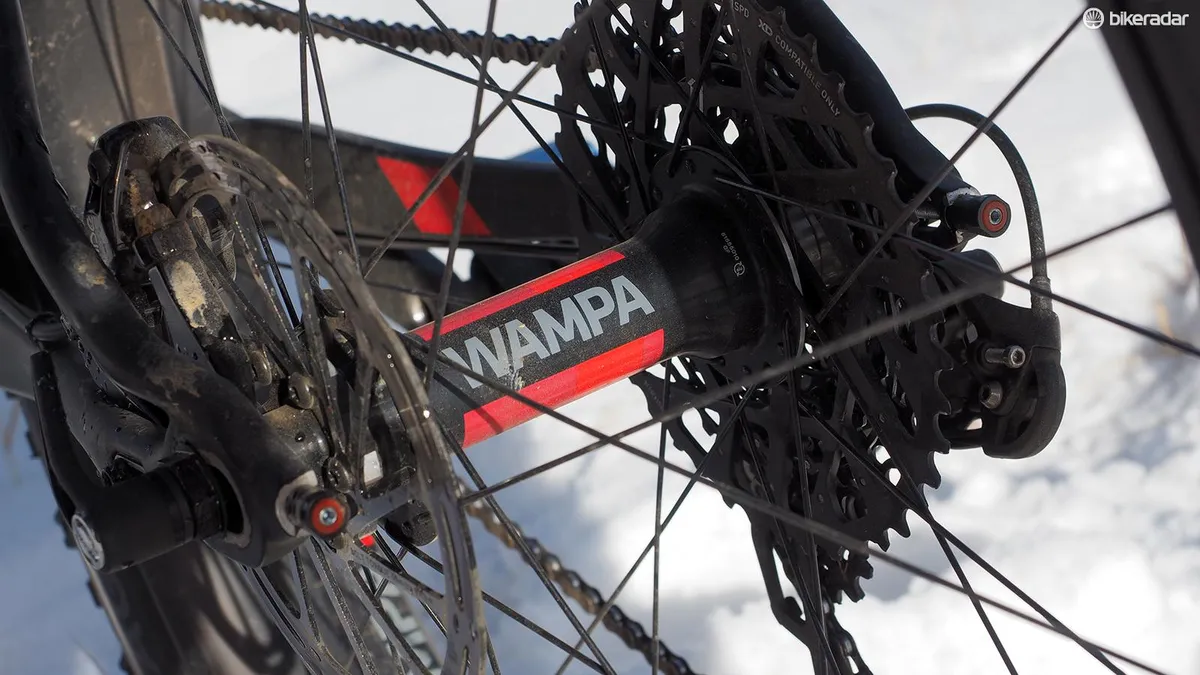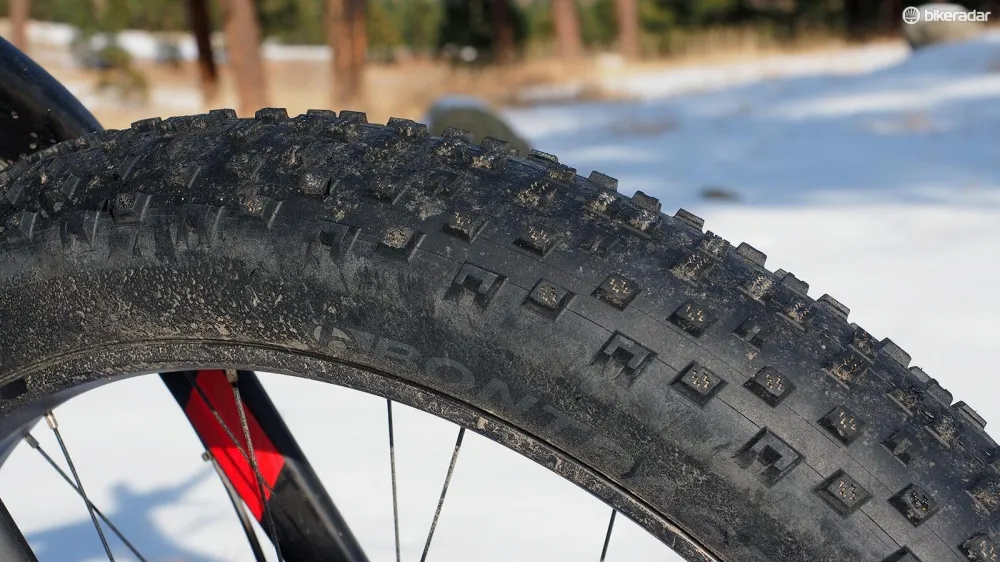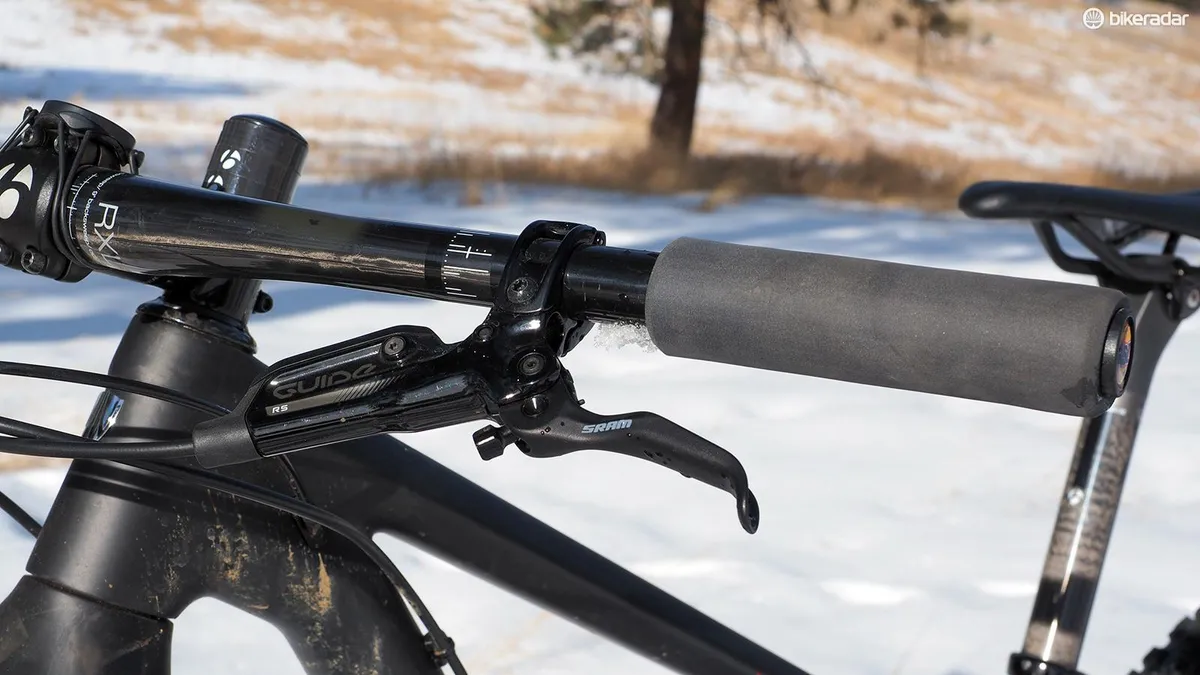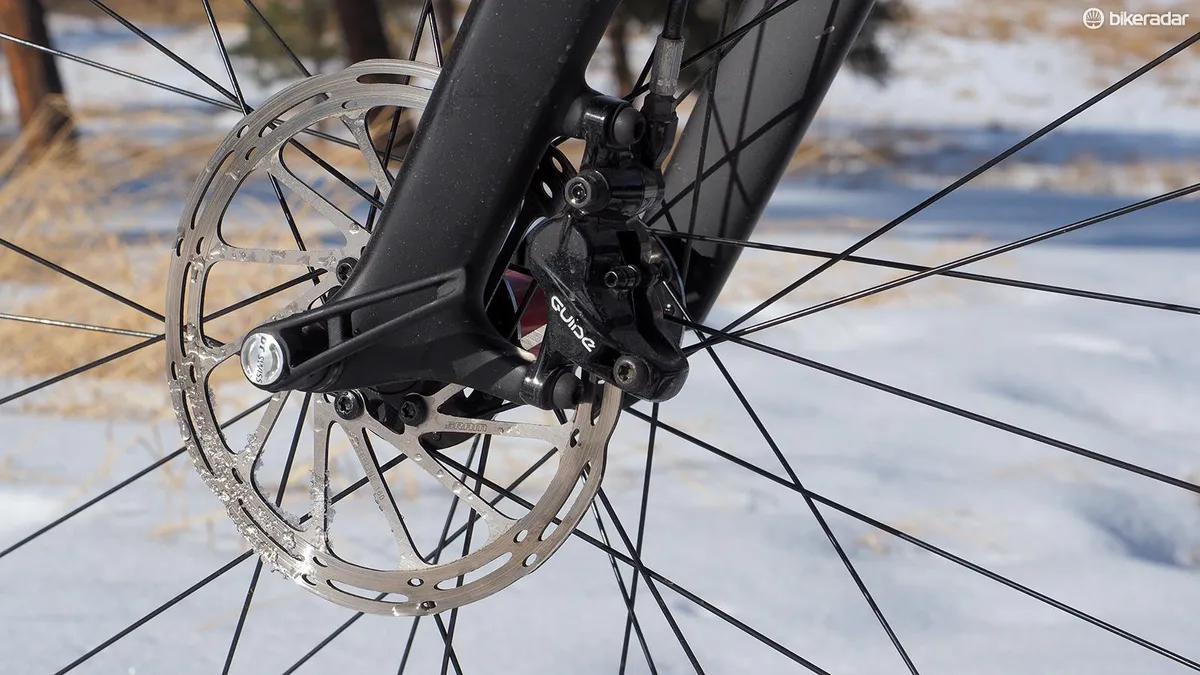If ever there were a fat bike built for racing, the Trek Farley 9.8 would probably be it. It’s wickedly light (less than 11kg!), configured out of the box for shredding groomed terrain, and with no suspension whatsoever – but lots of carbon fiber – there’s no extra baggage to slow you down. If going fast on snow is your thing, this bike has got you covered.
Wait, did you really just describe a fat bike as 'fast'?!
Seriously, toss aside your preconceived notion that fat bikes are inherently slow, lumbering beasts. Granted, there’s no way to fully disguise the additional rotating mass of a bike with feet this big but this top-end Farley 9.8 model so effectively minimizes that disadvantage that you quickly forget about it.
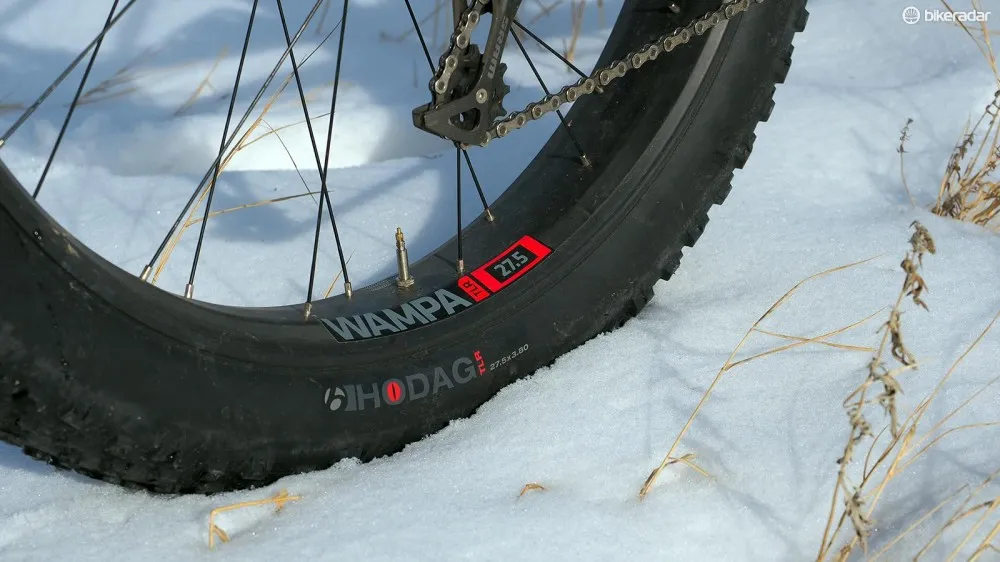
The 27.5x3.8in tires aren't great in unpacked snow but they're lighter and faster than what's usually found on fat bikes
First off, it’s remarkably light with an actual weight of just 10.82kg (23.84lb) in a 17.5in size without pedals. As a result, the Farley 9.8 is a treat to climb on, gobbling up vertical distance with surprising alacrity and aided in no small part by the bulbous tires’ generous traction. The fully rigid layout efficiently transfers your efforts to the ground, too, with no suspension action to dull the commands from the engine room.
That sensation of speed doesn’t just come about as a result of low weight, either.
Trek has always equipped its Farley fat bikes with narrower-than-typical 3.8in-wide Hodag tires, which imparts a fleeter feel than models more readily equipped to tackle deep snow both in terms of acceleration and handling. This time around, however, Trek has upsized the diameter to match, going with 27.5in wheels instead of the usual 26in ones. Especially when combined with the 9.8’s carbon rims – which lop off another 600g or so per wheel when set up tubeless – the rotating stock ends up lighter and quicker than more voluminous 26in wheels but with a nearly identical total diameter.
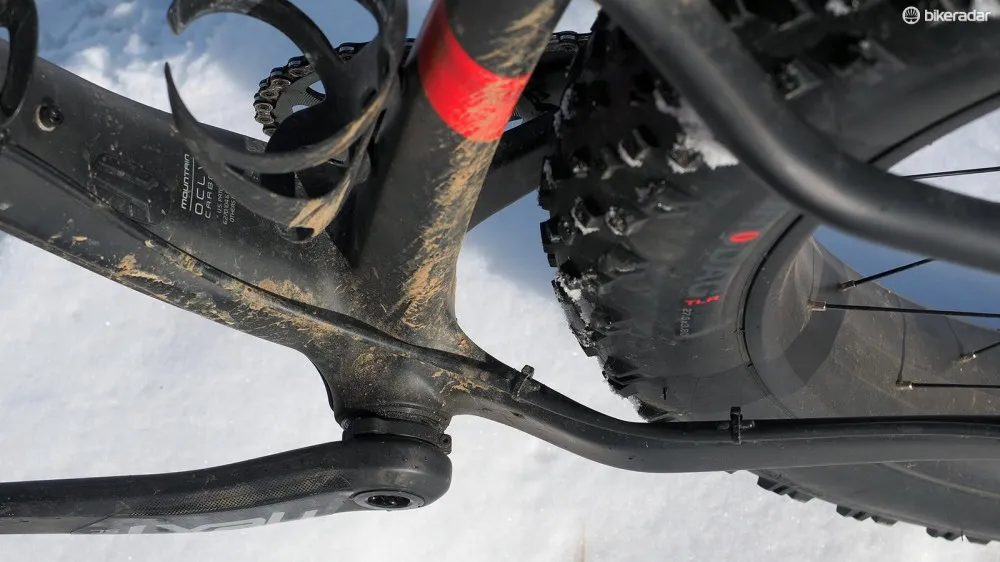
Careful frame design leaves room for 26x5in tires but without having to resort to a wide crankset or long chainstays
The forward-looking frame geometry only adds to the Farley 9.8’s sporty demeanor with tight 440mm chainstays – 15mm shorter than the Specialized Fatboy – a moderately long reach, a low bottom bracket, and a comparatively slack 69-degree head tube angle. Just as with similarly progressive-minded trail bikes, the result is excellent stability at higher speeds but with impressive agility at slower ones.
Unlike many fat bikes, there’s also little hint of ‘auto steer’ with a pleasantly light and natural feel through the bars – at least when the tires are inflated for anything other than deep snow – and the short head tube allows for a refreshingly aggressive position should you want it.
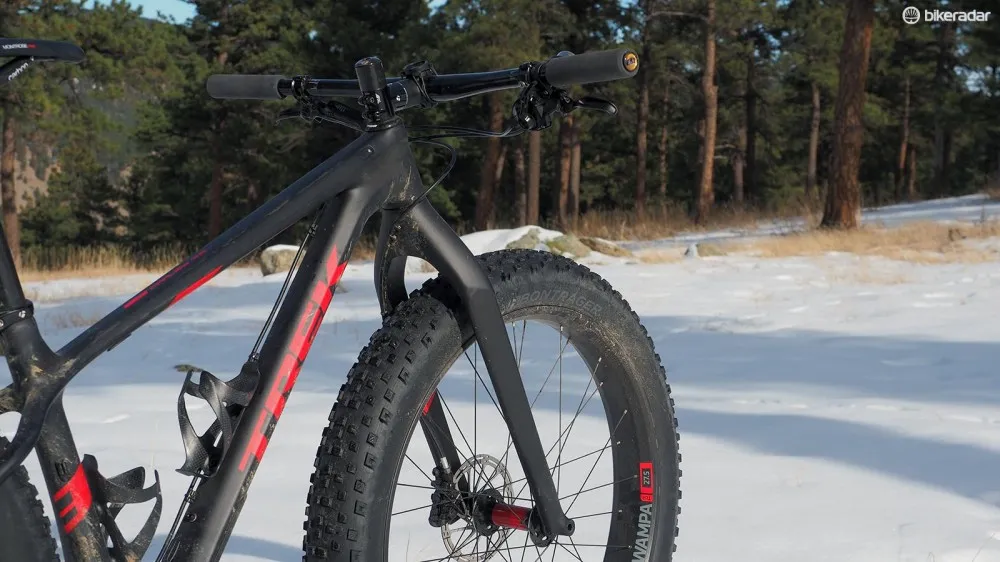
The rigid fork is ultralight and can be swapped out to a RockShox Bluto without adversely affecting handling
In eking out that elusive fat bike speed, though, Trek has unfortunately also made some major concessions in terms of deep winter capability as the stock wheels and tires simply don’t have enough volume or a sufficiently aggressive tread to tackle anything other than reasonably packed snow. In sketchier conditions, the 3.8in-wide Hodags just sink and wallow, quickly bogging down like skinny rockered skis in fresh powder.
In fairness, Trek has designed the Farley more for pre-packed winter terrain or even more all-seasons riding in mind and to that end, the formula works pretty well. The clever frame design will also easily swallow the widest 26in fat bike wheels and tires with no significant changes in geometry so you could swap in some bigger shoes should you decide to do some winter exploring – and in fact, Trek supplied a pair of loaner Bontrager Jackalope wheels and matching 26x4.8in tires for this test. As promised, it was a seamless swap and improved the Farley’s wintertime capabilities immensely.
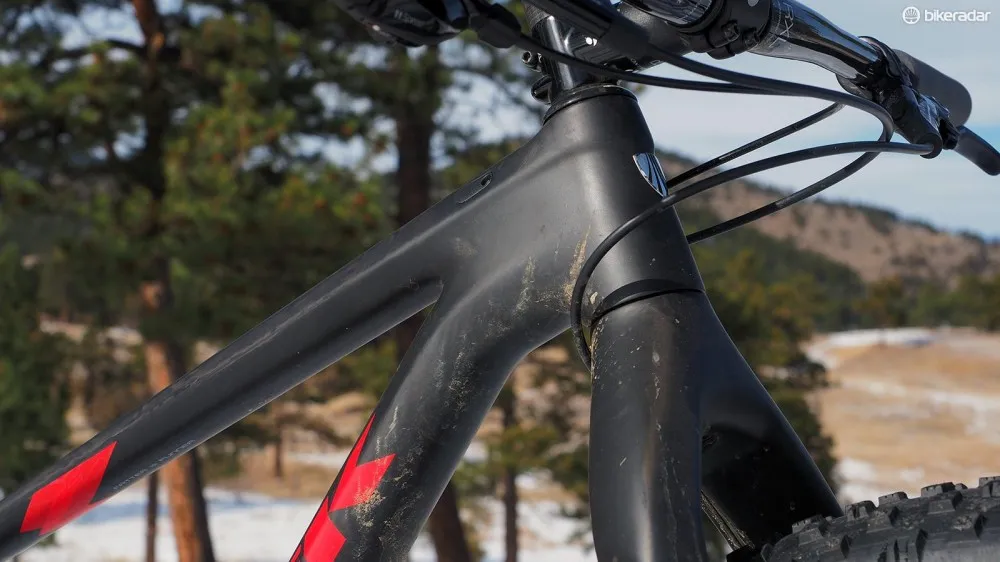
The front end is impressively clean
That said, buying another set of fat bike wheels and tires is an awfully expensive proposition on top of what is already a spendy endeavor, particularly if you want to maintain the premium quality of the rest of the build.
Clever carbon design blends best of fat and skinny
One of the biggest complaints with the previous Farley was its meager tire clearance, which barely accepted the then-stock 26x3.8in tires and certainly had no room for anything bigger. This time around, there’s more than enough Farley to go around with not only space for 26x5in rubber but little compromise otherwise to do so.
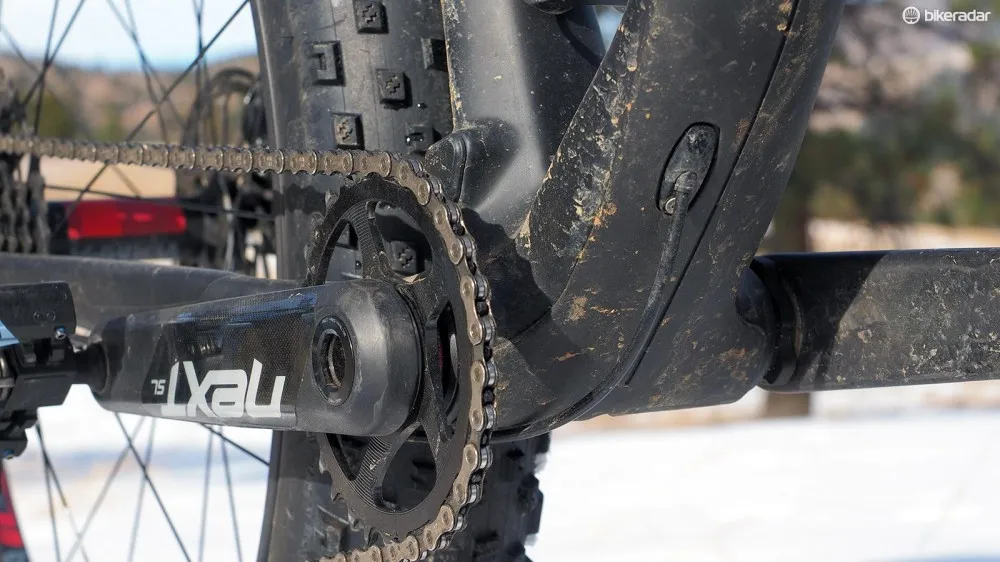
The press-fit bottom bracket is protected by a molded rubber guard
Out back, Trek has expectedly moved from the narrower 177mm thru-axle format to the wider 197mm one to better accommodate the bigger tires but the pedal stance width hasn’t changed. Credit goes to the carbon Farley’s crazy-thin chainstay profiles, an outwardly offset narrow/wide direct mount chainring, and a press-fit bottom bracket, which allows for wider chainstay spacing but the same crankset bearing locations as the previously threaded shell – and all without having to lengthen the rear end, either. As such, pedaling the Farley 9.8 thankfully still feels like riding a bike instead of straddling a horse.
Speaking of chainstays, Trek has added into this latest Farley iteration its adjustable Stranglehold dropouts, too. Out of the box, the wheel is set in the forwardmost position but should you desire a longer rear end for more stability, you can easily pull it out to a more generous 460mm.
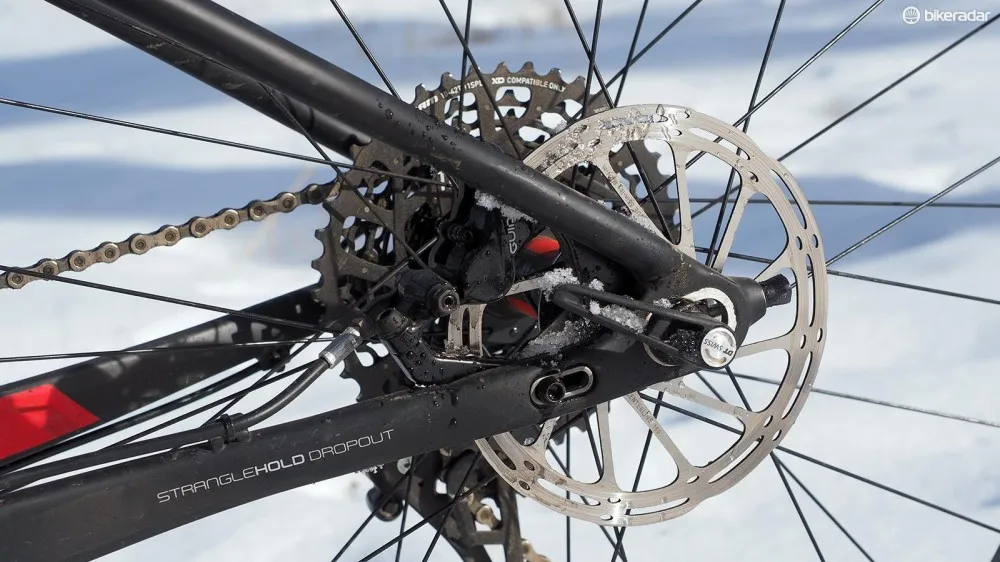
You can extend the rear wheel back by 20mm for extra stability or keep it at a tight 440mm for more nimble handling
Up front, there’s a featherweight all-carbon rigid fork with 150x15mm thru-axle dropouts and impressively tidy hose routing. Although this particular model prioritizes low weight, the fork offset and axle-to-crown length is designed for trouble-free swapping with a RockShox Bluto suspension fork (or, for that matter, a Lauf Carbonara).
Other niceties include internal cable routing for all but the rear brake (thank you, Trek!), a removable front derailleur mount, and a molded guard for the down tube and bottom bracket shell. Claimed frame weight is just 1.3kg (2.93lb) – barely heavier than many traditional hardtails – plus 550g for the matching carbon fork.
Carbon, carbon everywhere
It’d be easier to list the major components on the flagship Farley 9.8 that aren’t made of carbon fiber rather than point out the ones that are. Trek uses that black magic pixie dust for not only the frame and fork but also the 77mm-wide (internal width) Wampa hookless and tubeless-ready rims, the 720mm-wide Bontrager Race X Lite bars and matching seatpost, and the rails on the Bontrager Montrose saddle. As further commitments to beating the scale, Trek even specs ESI silicone foam rubber grips and Race Face’s ultralight Next SL carbon crankset.
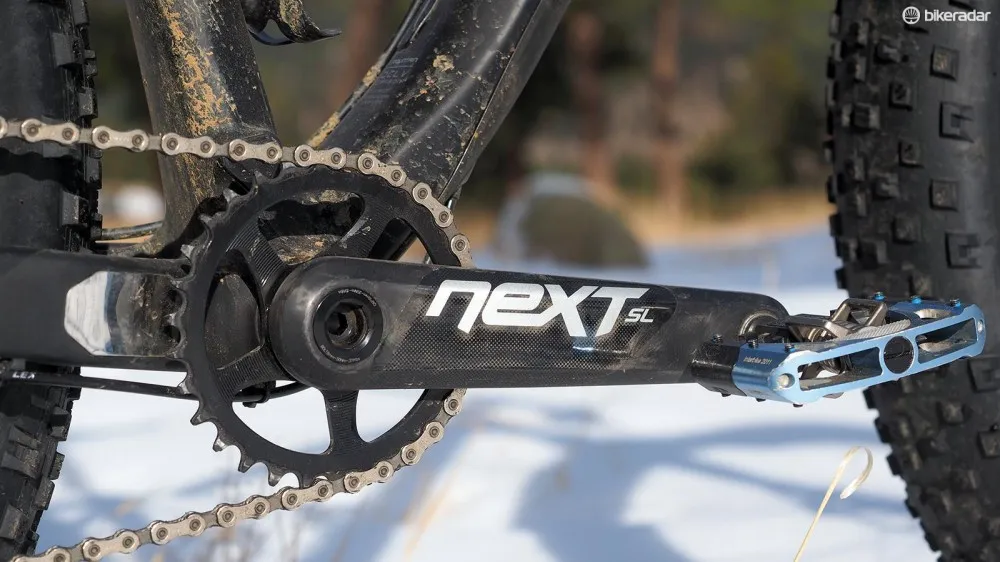
The Race Face Next SL is a great choice
Other highlights include Bontrager’s workhorse Race X Lite forged aluminum stem, a SRAM X01 1x11 drivetrain, SRAM Guide RS hydraulic disc brakes with quiet-running 160mm Centerline rotors, and an FSA integrated headset for the tapered 1 1/8-to-1 1/2in steerer.
On the whole, there’s little to complain about as Trek’s product manager has basically nailed the spec – assuming what you’re after is an ultralight fat bike suitable for racing. The drivetrain faithfully rattles off gear changes with little fuss, the Race Face bearings have held up impressively well to frozen slush and road spray, and SRAM has in one fell swoop exorcised its disc brake demons with the Guide’s superb control, power, and – finally – reliability.
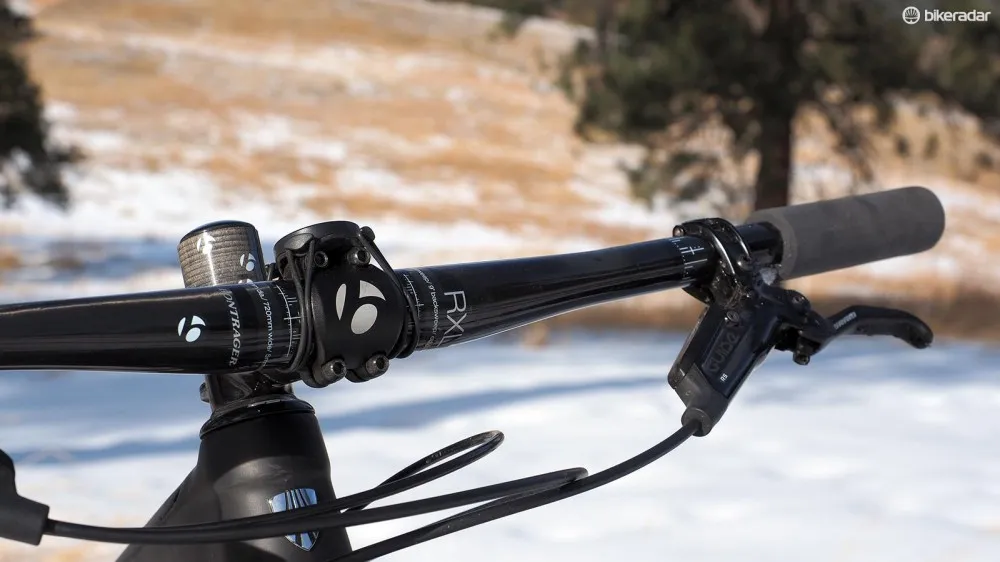
The carbon flat bar is a bit narrow at 720mm
That said, I still found the bars to be a bit on the narrow side and while I love ESI’s grips as much as anyone (I put them on my personal bikes, in fact), I occasionally wished for something a little stickier for winter-conditions riding. And finally, while I was fine without suspension up front, I frequently pined for a dropper post for the long and often technical descents I regularly deal with here in Colorado.
My only major complaint rests on the rear wheel, which is built around a rather cheap hub that’s frustratingly slow to engage – hardly befitting a fat bike with a price tag this high. It’s not a big deal in most situations but the lazy driver occasionally hampered restarts on steep ascents and definitely irritated any time I needed a quick half-pedal stroke on technical features. Trek already has the very fast-engaging Rapid Drive design in its corporate catalog so hopefully it will get added in here sooner than later.
Wicked good fun
Readers who just don’t get the appeal of fat bikes certainly aren’t going to see much sense in the Farley 9.8. But for those that do – and likely spend an inordinate percentage of the calendar year on one – one test ride on this thing will make nearly every other fat bike seem heavy. The price tag might not make sense to most riders but then again, neither does kitting up and heading out in a winter blizzard, either. As long as you’re okay with the slightly narrow tires’ limitations, this is one of the best performing fat bike options straight out of the box.
For more information, visit www.trekbikes.com.
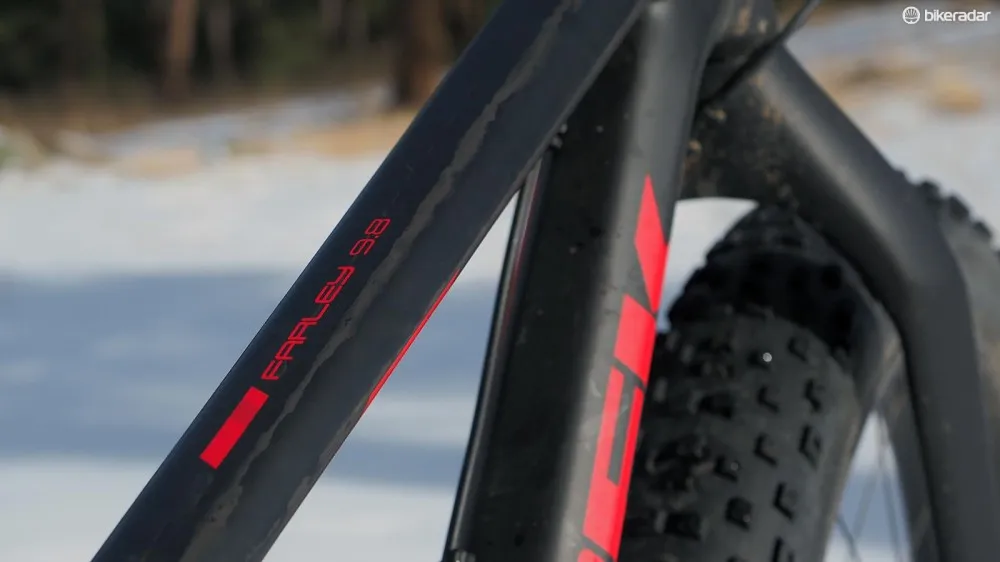
Full bike specifications:
- Frame: Trek Farley OCLV Mountain Carbon
- Fork: Trek Farley OCLV Mountain Carbon
- Headset: FSA IS-2, 1 1/8-to-1 1/2in tapered
- Stem: Bontrager Race X Lite
- Handlebar: Bontrager Race X Lite flat, 720mm
- Grips: ESI Chunky
- Front brake: SRAM Guide RS w/ 160mm Centerline rotor
- Rear brake: SRAM Guide RS w/ 160mm Centerline rotor
- Brake levers: SRAM Guide RS
- Rear derailleur: SRAM XO1
- Shift lever: SRAM X1 trigger
- Cassette: SRAM XG-1175, 10-42T
- Chain: SRAM PC-1130
- Crankset: Race Face Next SL w/ 30T chainring
- Bottom bracket: Race Face
- Wheelset: Trek Wampa
- Front tire: Bontrager Hodag, tubeless ready, 27.5x3.8in
- Rear tire: Bontrager Hodag, tubeless ready, 27.5x3.8in
- Saddle: Bontrager Montrose Pro
- Seatpost: Bontrager XXX
- Pedals: n/a
- Weight: 10.82kg (23.84lb, 17.5in size, without pedals)
Also consider:
Specialized Fatboy Expert Carbon
Carbon frame, carbon wheels and a rigid carbon fork create a light fat bike ready and willing to take on any winter endurance expedition. Read our full Specialized Fatboy Expert Carbon review.
Borealis Crestone
A gorgeous carbon frame and front suspension create a sleek companion for go-anywhere, do-anything jaunts on snowy trails and adventures. Read our full Borealis Crestone review.
